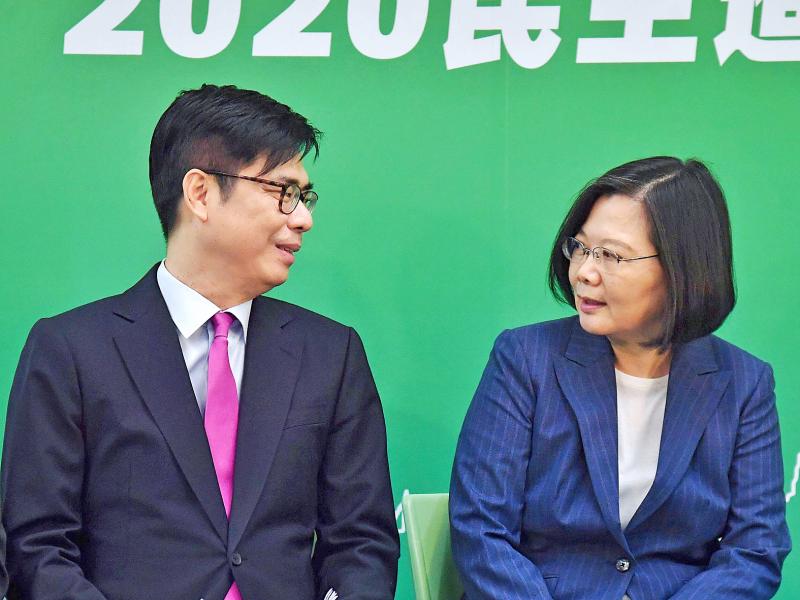The Democratic Progressive Party (DPP) yesterday confirmed that Vice Premier Chen Chi-mai (陳其邁) would be its candidate in the Kaohsiung mayoral by-election, as President Tsai Ing-wen (蔡英文) urged the party’s rank and file to support Chen’s campaign.
Tsai — joined by Chen, DPP Secretary-General Lin Hsi-yao (林錫耀), Tainan Mayor Huang Wei-che (黃偉哲) and Taoyuan Mayor Cheng Wen-tsan (鄭文燦) — made the announcement after a DPP Central Standing Committee meeting at the party’s headquarters in Taipei.
“Chen is a strong fighter, he is our party’s best candidate and the person most suitable for the job,” Tsai said, adding that Chen, who had been a long-time Kaohsiung resident and considers the city his hometown, had decades of experience in important local and central government positions.

Photo: CNA
Tsai said that she and Chen were shocked by the results of the Kaohsiung mayoral election in November 2018, which he lost to Chinese Nationalist Party (KMT) candidate Han Kuo-yu (韓國瑜).
“However, it taught our party a lesson: We must listen to Taiwanese and carry out reforms,” she said. “The residents of Kaohsiung are giving us the chance to take a make-up test — and we must stand, picking ourselves up from where we stumbled. We are determined to win not just for our party, but also for Kaohsiung — for new infrastructure and development.”
Chen said that he could provide the city with the leadership needed to reach a better future, bring it new hope and make true the party maxim: “DPP governance is quality assurance.”
“In the 2018 Kaohsiung mayoral election, I did not do enough, and the results let many people down. It was a big setback for me,” he said, “Now I want to return there, to work hard and fight together with the residents of Kaohsiung.”
Although born in Keelung, Chen grew up in Kaohsiung, and after completing a medical degree, he obtained a master’s in preventative medicine from National Taiwan University’s College of Public Health.
The 55-year-old was a DPP legislator for five terms and has also held top posts, such as DPP deputy secretary-general, Cabinet spokesman, Presidential Office deputy secretary-general and Kaohsiung deputy mayor.
After nearly 940,000 Kaohsiung voters cast their ballots to recall Han as mayor on June 6, a by-election to replace him was scheduled for Aug. 15.
Chen’s aides have organized a rally for tomorrow to launch his campaign and so that he can meet with Kaohsiung residents.
Chen said that his last Cabinet meeting would be today, which would allow him to say goodbye to colleagues and friends before going to Kaohsiung to focus on his campaign.
Executive Yuan spokesman Ting Yi-ming (丁怡銘) said that Premier Su Tseng-chang (蘇貞昌) had approved Chen’s resignation, effective tomorrow.
“In his resignation letter, Chen gave as reasons the opportunity to serve the residents of Kaohsiung and his decision to run in the by-election,” Ting said. “Premier Su approved Chen’s request and thanked him for his contributions during the COVID-19 outbreak and his handling of government affairs as vice premier over more than a year.”
Additional reporting by Lee Hsin-fang

SECURITY: As China is ‘reshaping’ Hong Kong’s population, Taiwan must raise the eligibility threshold for applications from Hong Kongers, Chiu Chui-cheng said When Hong Kong and Macau citizens apply for residency in Taiwan, it would be under a new category that includes a “national security observation period,” Mainland Affairs Council (MAC) Minister Chiu Chui-cheng (邱垂正) said yesterday. President William Lai (賴清德) on March 13 announced 17 strategies to counter China’s aggression toward Taiwan, including incorporating national security considerations into the review process for residency applications from Hong Kong and Macau citizens. The situation in Hong Kong is constantly changing, Chiu said to media yesterday on the sidelines of the Taipei Technology Run hosted by the Taipei Neihu Technology Park Development Association. With

A US Marine Corps regiment equipped with Naval Strike Missiles (NSM) is set to participate in the upcoming Balikatan 25 exercise in the Luzon Strait, marking the system’s first-ever deployment in the Philippines. US and Philippine officials have separately confirmed that the Navy Marine Expeditionary Ship Interdiction System (NMESIS) — the mobile launch platform for the Naval Strike Missile — would take part in the joint exercise. The missiles are being deployed to “a strategic first island chain chokepoint” in the waters between Taiwan proper and the Philippines, US-based Naval News reported. “The Luzon Strait and Bashi Channel represent a critical access

‘FORM OF PROTEST’: The German Institute Taipei said it was ‘shocked’ to see Nazi symbolism used in connection with political aims as it condemned the incident Sung Chien-liang (宋建樑), who led efforts to recall Democratic Progressive Party (DPP) Legislator Lee Kun-cheng (李坤城), was released on bail of NT$80,000 yesterday amid an outcry over a Nazi armband he wore to questioning the night before. Sung arrived at the New Taipei City District Prosecutors’ Office for questioning in a recall petition forgery case on Tuesday night wearing a red armband bearing a swastika, carrying a copy of Adolf Hitler’s Mein Kampf and giving a Nazi salute. Sung left the building at 1:15am without the armband and apparently covering the book with a coat. This is a serious international scandal and Chinese

COUNTERINTELLIGENCE TRAINING: The ministry said 87.5 percent of the apprehended Chinese agents were reported by service members they tried to lure into becoming spies Taiwanese organized crime, illegal money lenders, temples and civic groups are complicit in Beijing’s infiltration of the armed forces, the Ministry of National Defense (MND) said in a report yesterday. Retired service members who had been turned to Beijing’s cause mainly relied on those channels to infiltrate the Taiwanese military, according to the report to be submitted to lawmakers ahead of tomorrow’s hearing on Chinese espionage in the military. Chinese intelligence typically used blackmail, Internet-based communications, bribery or debts to loan sharks to leverage active service personnel to do its bidding, it said. China’s main goals are to collect intelligence, and develop a